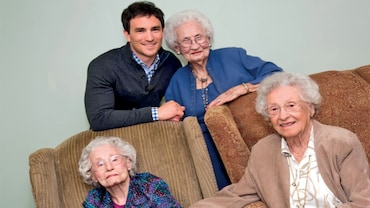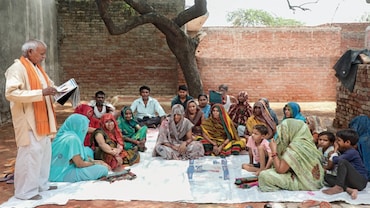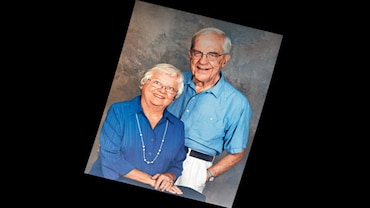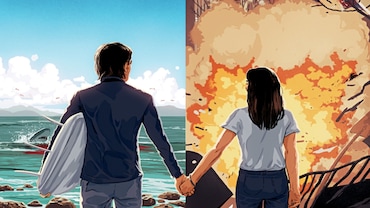Sky Runner
How pure resilience helped this young man from Morocco scramble his way to victory—in both sport and in life
 photo: ©JCD PHOTOGRAFIA/carrerasdemontana.com
photo: ©JCD PHOTOGRAFIA/carrerasdemontana.com
The eyes of the crowd are on Zaid Ait Malek as he takes his place at the starting line. Wild-haired and wiry, he clowns around with fellow competitors, but then, as the race countdown begins, Zaid falls silent, staring straight ahead.
“Ten, nine …” The 38-year-old mountain runner visualizes how he’ll handle the course’s challenges, when he will push, when he’ll hold back. Zaid touches his fingers together in prayer. God protect us all and return us safely.
The way Zaid approaches this run—the Calamorro Skyrace in March 2022—is the way he approaches life. Faith, resilience and joy have helped him navigate the journey from stowaway from Morocco, to sports hero in Spain, to being a husband and father.
But his focus right now is the start of this 27-kilometer run through mountains high above the southern Spanish coast. “Two, one.” When the signal sounds, the ‘sky runners’ pound away and quickly disappear. Some 120 elite runners from across Spain are competing for a trophy and a prize (Rs 1,05,780 for the winner).
Moving past brush, loose stones underfoot, Zaid is transported back to his childhood, to the Atlas Mountains where he grew up.
While city children have parks to play in, Zaid and his nine siblings—he is third youngest—had steep, sheer mountains. They played with goat kids near the family jaima, the tent that nomadic Berbers live in; his mother had woven it from wool. The goats were part of a herd his family cared for and moved with as they sought new grazing areas. Zaid loved watching the sure-footed animals jump from rock to rock, and mimicked their technique until it became instinct. Another favourite game was throwing stones down the mountainside and chasing them as fast as he could.
The family’s jaima was above Oudadi, an isolated village some 350 kilometres inland from Casablanca and about the same distance northeast of Marrakesh. As Berbers, they lived removed from modern life, with their own ancient culture and language. Life was hard. Zaid’s mother, Heda, often went without food so there was enough for her children. Hssain, his father, was a thinker, full of ideas and plans to make things better, and he wanted the best for his children.
When Zaid was six, Hssain asked him, “Do you want to go to school?” Zaid wasn’t sure, but when his father bought him a book bag at the market and told him, “study well and strive for better,” he couldn’t refuse. Anyway, he really wanted the bag.
As the first of his siblings to attend school, Zaid found it a shock. He couldn’t read or write and spoke only Berber; he didn’t know Arabic, Morocco’s official language. In the playground, he watched the other children play, but didn’t know how to talk to them or join in. And living in a house—he was staying with his older brother’s family in Oudadi to be close to the school—was also strange. He missed falling asleep in the jaima’s one room as his parents told him stories, and waking to the sound of bleats and birdsong. He lived for the holidays, when he could run free in the mountains.
 This photo of Zaid’s sister, Smol, and his mother, Heda, was taken in Oudadi when Zaid was growing up. Photo Courtesy of Zaid Ait Malek
This photo of Zaid’s sister, Smol, and his mother, Heda, was taken in Oudadi when Zaid was growing up. Photo Courtesy of Zaid Ait Malek
But Zaid was adaptable and made friends fast, and he was always top of the class. Hssain burst with pride when he looked at the school reports his son brought home. Zaid, who had learnt Arabic, went on to college, but knew his father struggled to support him. “I should be earning money, not costing it,” Zaid finally told him, and, against his father’s protests, he left school in his late teens to work alongside his cousin Hassan as a labourer on building sites in Casablanca and the capital, Rabat. Ambitious and keen to keep learning, Zaid caught the eye of his boss, who trained him as an electrician and gave him the higher-paid jobs. By age twenty, Zaid was earning enough to send money home. Life was good.
But the talk among the rest of the workers, especially Hassan, was that life was better in Europe, where wages were double or triple what they earned in Morocco. When a boy from near Oudadi returned from Spain with a foreign car, Hassan told Zaid, “We’ll be working all our lives and never be able to afford a car like that.” For most, the only way to get into Europe was illegally, hidden in a lorry aboard a ferry, making the 30-kilometer voyage across the Strait of Gibraltar. Hassan often spent his days off in the port city of Tangier, watching for opportunities to leave Morocco.
In late December 2006, Zaid was at his parents’ jaima, preparing for the Muslim festival Eid al-Adha, when Hassan called from Tangier. “I’m going to escape,” he said. “Come help me find a way to get to Spain.” Zaid said no, telling him, “You’re mad!” In the end, though, he made the long journey to Tangier—but only to fetch his cousin home for the family celebrations. On 30 December, the pair took a late afternoon stroll to the port—“just for a look,” Hassan promised—before heading back to Oudadi. But when a lorry, blocked by a taxi, stopped beside them, Hassan quickly disappeared beneath it. “You’re going to die!” Zaid hissed. “Come out!” But with the sudden panic came an impulse—he too ducked under the lorry and grabbed hold of the undercarriage.
The cousins clung on as the lorry boarded the ferry. Once the drivers headed to the upper deck, the two dropped down and found a canvas-covered trailer to hide in. Zaid was wearing just a tracksuit and trainers, and they had no water, but as the ferry set sail he felt strangely calm. I’m here now, he thought. This door has opened and I’m going through.
A Stranger in a Strange Land
At the Spanish port of Algeciras, the stowaways cautiously peeked out. They’d arrived at midnight and the driver had left the trailer in the car park and driven away. By 1:30 a.m. the port was silent; the pair left the trailer and headed for the busy coastal motorway, the Autovía del Mediterráneo, where they began walking northeast towards Málaga. It started raining, so they took refuge under a concrete bridge before starting again at daybreak.
Around 9 a.m. a car slowly approached. “Police!” shouted Hassan, and took off down the road. Zaid jumped a fence and hid behind a tree. When he peered out, he saw the police car coming. Hassan, who had been caught and was in the back of the car—and would shortly be deported—could only watch as his more athletic cousin sprinted off the motorway and out of sight. Zaid ran until he reached a quiet road. He felt very alone. He was an illegal immigrant, he hadn’t eaten in 24 hours, and he had only the wet clothes on his back and a little Moroccan money. He knew nobody, didn’t speak Spanish, and had nowhere to go.
But he remembered his father telling him, “You must always follow the open way.” He had to trust that his father was right. It was New Year’s Eve, the right sort of day for new beginnings. When he passed a service station, the Arabic-speaking woman working there called him over and offered him coffee, breakfast, and a bag filled with bread and Coca-Cola. She also gave him the name of friends in Barcelona, so Zaid began to walk in that direction. A couple of hours later, he got a lift from some Moroccans who took him to their house, let him shower, and gave him fresh clothes. When he told them where he was going, they laughed. “Walking? It’s nearly a thousand kilometers. It will take you months!” They were going to visit family in the province of Almería and invited Zaid to join them.
 Before his fateful, unplanned departure from Morocco, Zaid worked in Rabat. That’s him in the front, with colleagues. Photo Courtesy of Zaid Ait Malek
Before his fateful, unplanned departure from Morocco, Zaid worked in Rabat. That’s him in the front, with colleagues. Photo Courtesy of Zaid Ait Malek
In Almería, Zaid called his mother from a pay phone. “We didn’t know where you were,” she said, worry in her voice. “You didn’t even plan to leave!” Zaid reassured her he was safe, but added, “Now that I’m here, I’m going to try to make a better life.” Hanging up, Zaid heard someone speaking Berber. The man in the next booth introduced himself as Jilali—and he was from a village near Oudadi. “What a coincidence!” exclaimed Zaid. Jilali said he worked nearby as a fruit picker; his boss had given him a house to use and was looking for workers. “Come with me,” he said. Meeting someone from home felt like fate, and so, after thanking his new friends, Zaid left with Jilali.
Picking tomatoes and watermelons for eight hours a day gave Zaid blistered hands and backache, and the temperatures under plastic, which hit the mid-40s in summer, were tough to bear. Zaid was now working close to the Tabernas Desert in the sprawl of horticultural hothouses known in Spain as the Sea of Plastic. As an illegal immigrant Zaid could be deported at any moment. But it was worth it; his boss gave him a contract and paid his taxes and contributions. And after three years Zaid would be eligible for Spanish residency. Then he could look for a better job and visit his family.
Jilali’s house was run-down, with no electricity, so Zaid set to work hooking up a power supply, and bought light bulbs and plugs, a television, and the tools and parts to fit a shower. When the boss came for a visit, he was amazed. “What has happened!” he said to Zaid. “You’ve just got here and you’ve done all this?” Meanwhile, Zaid’s fellow workers, on seeing how fast he ran on the football pitch on his time off, invited him to join the local team. And he began to teach himself Spanish so he’d be ready for any future opportunities. Finally, he felt his life was coming together.
An Unexpected Detour
One morning in 2009, two years after his arrival in Spain, Zaid’s phone rang as he was picking tomatoes. It was his brother, in tears, saying, “Our brother Hassan is dead.” A bottle of butane had exploded, and Hassan, the second eldest sibling, had died of his injuries. Then his father came to the phone. Zaid told him, “I’m coming home.”
But Hssain said, “Nothing will be gained by that. Your brother won’t return and you’ll regret it. Stay on the path. Find what you are searching for and accomplish your dreams.” Zaid sat on a crate in the hothouse and cried. Then he shut himself in his room, not working and barely eating for two weeks, just lying on the bed, turning things over and over in his mind. His friends rallied round, persuading him to stay.
It was true, Zaid knew, that with the money he was sending home, his father had managed to buy a half-built house and was working on finishing it. So he decided to try to stay positive. He was homesick, but would push on. A year later, he received another call from Morocco—his father had passed away from cancer. It was the bitterest of blows: Zaid was tortured knowing how much his father had missed him. He wept, thinking, He did so much for me and died without me.
Zaid was just weeks away from getting the papers that would allow him to stay in Spain; finally, three years after leaving Morocco, he would be able to go see his family. But when he made the application in January 2010, it was denied; he was told he hadn’t worked enough days to qualify, yet he knew he had. Zaid confronted his boss and discovered that in order to save money, he hadn’t declared the full number of days Zaid had worked.
Zaid was shocked. But as an illegal alien there was nothing he could do. If he wanted a life in Spain, he would have to stay and work an extra year to make up the time. In October, when he heard about temporary work picking olives in the groves of Baena, in the autonomous region of Andalusia in southern Spain, he left, hoping to find a more reliable boss. With nobody to play football with in his new base, Zaid took up running. One rainy evening, he caught up with three Spanish runners from the local athletics club, Media Legua Baena. They talked a lot over the 16-kilometer run, Zaid effortlessly keeping pace. He was wearing old trainers and had no fancy running gear, but the club members could see he had talent.
The following day, as Zaid watched people training at the athletics club, a police car drew up. His heart pounded as a uniformed officer lowered his sunglasses. “Remember me?” he said, and to Zaid’s relief he saw it was one of the runners. “The club president wants to meet you,” said the man. Media Legua was looking for talented runners to help them win regional road races, but, more importantly, the members were part of a kind and welcoming community. “If we help you with residency papers and look for work for you,” Jesus Morales, the club president, told Zaid, “would you like to stay with us as a runner for the club?”
“Yes!” Zaid replied.
 This photo was taken when Zaid worked as a tomato-picker soon after arriving in Spain. Photo Courtesy of Zaid Ait Malek
This photo was taken when Zaid worked as a tomato-picker soon after arriving in Spain. Photo Courtesy of Zaid Ait Malek
One of his jobs was assisting Carlos Chamorro, who ran the club’s training program for kids. Carlos took in Zaid’s huge smile and friendly manner as Jesus introduced him, and liked him immediately. The new assistant’s enthusiasm and sense of fun soon made him a hit with the children, too.The club members made Zaid feel like one of the club’s family, helping fix up a house for him and donating the furniture he needed. “We loved him so much and he, us,” recalls Jesus. “We shared what we had, and he gave us everything he had to give.”
After some technical training, Zaid—who had been nicknamed “Ferrari” by club members—was soon travelling on the team bus and proudly running for the club in road races across the region.One Saturday late in 2010, Carlos invited his friend for a training run in the nearby Sierras Subbéticas mountains. Running in this kind of terrain, Zaid was in his element. “This is like being six years old and playing in the Atlas Mountains again,” he told Carlos, laughing as he leapt up the steep and rocky terrain and sprinted down the slopes. Carlos couldn’t believe his eyes. He’s like a mountain goat! he thought. He has no fear!
While road races are run on even surfaces, mountain running involves rough trails and steep climbs. Carlos explained there were trail-running and high-altitude competitions for local, regional, national and world titles. Zaid listened, amazed—this was the challenge he’d been searching for! “There’s a race here in the Subbéticas next spring,” said Carlos. “We should train and try to get in.”
The race was the 2011 Subbética Trail, a 26-kilometer regional championship that attracted the best runners in Spain. Along with a small group from the club, Carlos and Zaid both qualified. On the day, Zaid, sporting new trainers, lined up with more than 150 competitors—and set off fast. Running behind, Carlos could hear competitors discussing his friend. “He thinks it’s a road race!” said one. Going too fast uphill would soon sap any runner’s energy.
But Zaid made it up the mountain so quickly that, once on top, he couldn’t see anyone following, and started to panic. I’m lost! he thought. Just then the race steward, who’d been resting nearby, jumped up, startled. “You’re here already?” he gasped. Zaid pushed on, running incredibly fast on the dangerous downhill portions, too, and won the race. It was a dream come true to cross the line to loud applause—and to share this experience with the people who had helped him so much. He had finished two minutes and 17 seconds ahead of the reigning champion and more than ten minutes ahead of the rest of the field. Leads in these races are usually measured in seconds.
For an unknown beginner to win this prestigious event by such a margin was astonishing. Everyone was asking who he was and where he’d come from. The regional selector said he thought Zaid could qualify for the national championship, the Copa de España. He did—and he beat all competition in 2013 and again in 2014. Such was his mental and physical drive that Zaid even won races while fasting for Ramadan—though he would say it was his Muslim faith that gave him strength.
One of Spain’s most iconic high-altitude races is the Zegama-Aizkorri Marathon. It’s 42 kilometers, with an elevation gain of 2,700 metres. Thousands of runners apply to enter; only 500 qualify. Although Zaid was a newcomer, in 2013 the club persuaded the organizers to give him a chance. When he came fourth, completing the race in less than four hours—only four minutes behind the winner—it was clear to everyone Zaid had the potential to become world champion. Zaid was rising through the ranks, and, because he was about to shift his focus to running in the more elite races, he and Carlos ran their last race together in 2015. As Carlos approached the finish line, he saw his friend waiting for him—so they could cross the line together.
 Zaid at the 2015 Transgrancanaria race. Photo courtesy of Transgrancaria
Zaid at the 2015 Transgrancanaria race. Photo courtesy of Transgrancaria
Reunited
With the Baena club’s help, Zaid had finally received his Spanish residency papers. He would need to re-qualify each year, fulfilling a minimum number of days of employment. But it meant that finally, in 2012, he would be able to leave Spain to visit his family.
It was midnight when he arrived home and pushed the door open. Everyone was waiting for him. There was sadness that his father and brother weren’t there to greet him, but his mother was bravely determined to make this a joyous homecoming. She stepped forward and embraced him, smiling. “I’m happy to see you return,” she told him. Zaid promised he’d come again soon, and often. Though Zaid’s life was now in Spain, his roots were in Morocco, and soon, so was his heart. A young woman named Aicha Ouhou, born in the neighbouring village but raised outside the area, was part of an extended circle of friends who followed Zaid’s racing success on Facebook. The two had never met, but in the course of online chats they had developed a special bond. On Zaid’s second visit home, in 2013, he met Aicha for the first time. As soon as he saw her laughing eyes, he knew they would be together—the glances they shared spoke volumes. On subsequent trips a romance blossomed; they married the next year. Carlos and friends from Baena attended the wedding in Oudadi, and to Zaid, watching as they celebrated with his family, it was as if all the parts of his life—love, running, happiness, and success in two countries—had finally come together.
Then came a major setback. In 2014, the Andalusian Mountaineering Federation (FAM) began what was intended to be a fast-track process of naturalization for Zaid on the basis of his exceptional value to Spanish athletics. But nothing happened.
Over the coming years, nobody knew why Zaid wasn’t getting a response from the government on his naturalization application. Then, in 2018, he learned he was about to be deported. Because he was racing so much, he had fallen short of the number of days he was required to work in order to retain his residency status. “This is the end of the dream,” he told his friends. “I’m done.”
But his friends were having none of it. As Zaid’s spirits flagged, the international running community stepped in to support him. Spanish runner Javier Ordieres started an online campaign called “Zaid Stays!” (#ZaidSeQueda) to put pressure on the authorities, and it quickly spread across social media. “The moment we heard he needed help,” says Javier, “everyone threw themselves into it 100 per cent.” On September 29, 2018, Zaid began what was to be his last race before deportation, the 110-kilometer Ultra Pirineu in Bagà, Spain; there were 923 participants. He was exhausted by stress, but hundreds of people were there to encourage him, holding placards and cheering him on. He ran like the wind and finished second. As he stood in the finish line area he looked at his phone and saw hundreds of messages of support flooding in, among them offers of legal help. It was soon discovered that the citizenship application prepared in 2014 was still sitting in the registry in Baena; apparently, a clerk had mistakenly filed it away.
 Zaid and his family at the Jimbee Volcano UltraMarathon in Cartagena, Spain, in autumn 2022. Photo by jose miguel muÑoz
Zaid and his family at the Jimbee Volcano UltraMarathon in Cartagena, Spain, in autumn 2022. Photo by jose miguel muÑoz
Zaid was granted Spanish nationality on 30 November 2018. After 12 years of uncertainty, he was finally safe, finally settled. Signed by Jimbee, a major Spanish sports sponsor, he has a team behind him that believes in him, and the support he needs to pursue his professional career.
In some races, the winner is called ‘Champion of Spain’. But as a Moroccan citizen, Zaid had up to now been unable to step up to the podium when he won those; that honour went to the Spanish second-placed runners. Ever generous of spirit, Zaid had said he didn’t mind. But, clearly, it wasn’t right. Now, he could take his place on the podium. And he can compete in international events, like the 244-kilometer Volcano UltraMarathon in Costa Rica—a showcase for mental and physical fortitude—which he won in 2021. His ambition is to become the mountain-running champion of the world.
The Finish Line
it’s the 2022 Calamorro Skyrace, where our story began. Zaid reaches the finish with great loping strides and a wide grin, and takes second place. He hugs the winner, congratulating him, then looks around for Aicha, who is waiting by the barrier with their seven-year-old son, Elhousseine. Along with their baby girl, Israa, they live in Cartagena, on the Mediterranean coast in the Spanish province of Murcia. But Zaid’s Berber roots are all-important.
“I’m building a house near my mother’s in the Atlas Mountains, and we’ll spend part of the year there,” he says. “It’s a fine place to bring up children, in the middle of nature. And it’s perfect for high altitude training. I’m hoping to make it a centre where runners from all over the world can stay and train.” Zaid took his father’s advice: He stayed on the path, and, despite the challenges, fulfilled his dreams. Smiling, he offers his secret to success: “Just jump from stone to stone like a goat—and always think positively.”






